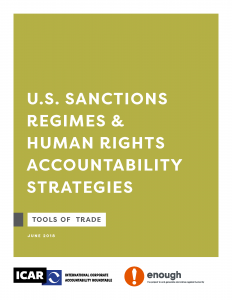 Sanctions represent an essential part of the U.S. foreign policy toolkit, yet human rights practitioners and advocates often lack the essential understanding of how they work.
Sanctions represent an essential part of the U.S. foreign policy toolkit, yet human rights practitioners and advocates often lack the essential understanding of how they work.
In the new paper, “Tools of Trade: U.S. Sanctions Regimes and Human Rights Accountability Strategies,” the International Corporate Accountability Roundtable and Enough Project lay out the essential elements of how sanctions programs are created, implemented, and enforced. Specifically, the paper details of the legal authorities underlying sanctions, the agencies involved, and the approaches to implementation that have proved most effective.
The paper then moves from sanctions architecture to analysis and strategy. As sanctions become an increasingly important tool for policymakers, human rights advocates must understand the newer approaches developed in recent years. Sanctions no longer focus on comprehensive trade embargoes, which prohibit almost all transactions with individuals in the targeted country, but rather operate through innovative targeting strategies and enhanced enforcement.
Specifically, the paper discusses the following sanctions programs or mechanisms that can be leveraged to promote human rights abroad:
- imposing targeted designations through existing country programs;
- targeting international actors responsible for corruption or serious human rights violations using Executive Order 13818, “Global Magnitsky” program;
- leveraging sectoral and secondary sanctions for human rights objectives; and
- using sanctions authorities to increase transparency requirements for businesses engaged in areas with specific human rights risks.
The role and efficacy of economic sanctions and broader tools of financial pressure have evolved dramatically in recent years. Yet, too often, human rights advocates lack the understanding of how these tools work, which government agencies are involved, and where they have been most effective. This report provides a guide for advocates and others, so we can move past older conceptions of these tools and ensure the most effective pressures can be deployed not only against threats like proliferation and organized crime but to advance human rights and peace.” – Brad Brooks-Rubin, Managing Director, Enough Project.
Seeking accountability for victims of human rights abuses committed by powerful actors such as multinational corporations often feels like a battle between David and Goliath. And yet, economic sanctions can be a powerful and effective tool to stop these abuses in places where accountability strategies are otherwise not available. With this report, we hope to equip the human rights community with another tool to tackle some of the most serious human rights challenges.” – Sophia Lin, Legal and Policy Coordinator, International Corporate Accountability Roundtable.
As activists and policymakers increasingly consider the use of this robust financial tool, this paper provides a framework and reference to ensure they are understood and used appropriately.
Click here to read the paper.

